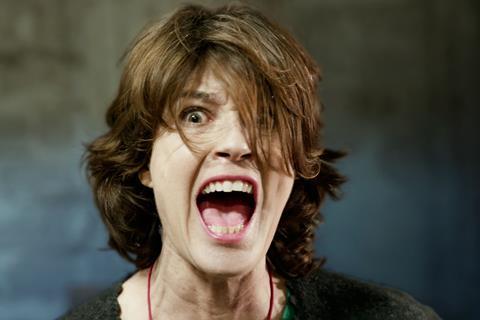Amos Gitai transplants Eugene Ionesco’s 1959 protest play ’Rhinoceros’ to modern Israel

Dir: Amos Gitai. Israel/France/Italy/Brazil/UK. 2024. 85mins
French-Romanian writer Eugene Ionesco’s celebrated 1959 play Rhinoceros was an angry, sardonic parable about the rise of Fascism. Amos Gitai’s loose transposition of the text to present-day Israel could well be angry and sardonic, but it is so weighed down by accumulated layers of stagey metaphor and allusion that, aside from a few lucid moments, it’s difficult to tell.
Weighed down by accumulated layers of stagey metaphor and allusion
Shikun uses the dilapidated remains of mid-to-late 20th century Israeli architecture and town planning as the stage for a series of walk-on monologues. One unnamed character, played by French-Swiss actress Irene Jacob, recurs as a kind of Cassandra chorus, lamenting, in French to some unidentified ‘you’, the state of the nation she has found here. Among her first words are “I’m made angry by what’s going on here”.
We wait patiently for elucidation. But, over the next 80 minutes, it comes only in short flashes that pierce through a mist of seemingly unconnected vignettes. Possibly in Israel, the sight of a Scout marching band playing ’Amazing Grace’ in an underground car park may have the audience nodding sagely, or weeping tears of laughter. Bemused bafflement would seem to be the most likely response to much of the rest of Gitai’s unfocused satire.
Ionesco’s play was set in a provincial French town whose inhabitants, after initially dismissing a rhinoceros invasion – or denying that it is happening – gradually begin to turn into the horned ungulates themselves. Written at a time when authoritarianism was once again on the rise, only 14 years after the defeat of Hitler and Mussolini, it was both absurd and trenchant.
Gitai reportedly conceived this loose adaptation before the brutal October 7 Hamas attack on Israel and the country’s subsequent invasion of Gaza, in response to prime minister Benjamin Netanyahu’s widely criticised attempts to reform Israel’s judicial system and curb the legislative power of the Supreme Court. It could equally apply to the current state of Israel, in which military force has all but silenced the protests that had threated to topple the government. But so intensely literary and aulic are most of the lines delivered here that they could be handily retrofitted to a huge range of future ills. Having most of the speakers in continual motion – dancing like Jacob, walking, running, zooming around on electric scooters – does little to make the drama any less static.
Gitai trained as an architect before becoming a filmmaker. Might the Brutalist settings of Shikun be his admonishment that these monuments of Israel’s optimistic boom years of the 1950s and 1960s have become repressive cages? The film’s first half is dominated by a single uncut sequence filmed in the ‘Quarter Kilometre Building’, built in 1958 in Beersheba, a new town that was planted in the middle of the Negev desert. In the open walkway that runs along an upper floor, Jacob passes the narrative baton to a series of other walk-ons: a war veteran, an architect and developer arguing about the siting of a new synagogue; a pair of orthodox Jews discussing an arranged marriage; a woman who is teaching Hebrew to a class of Jewish immigrants from places like Belarus, India and Ukraine.
Are these Jewish incomers the rhinos? Are they Israeli Arabs like the character played by Bahira Ablassi, who sits in a basement workshop fashioning rhino horns? Are they those turncoat liberals who have swallowed the bitter authoritarian pill in the interests of national unity?
The few moments of audience engagement on offer in Shikun have little to do with line delivery. When Hanna Laszlo – who won the Best Actress award at Cannes in 2005 for her performance in Gitai’s Free Zone – reads out fragments of text written by children in the infamous Theresianstadt Ghetto, everything feels real for a brief moment. A similar flare-up of emotional truth comes when, in a scene set in the bowels of the Tel Aviv bus station (one of the largest in the world), a jogging young woman speaks words borrowed from Israeli journalist Amira Hass: “Perhaps the day will come when a whole generation of young Israelis will ask their parents: ‘How could you?’”. If we listen up then, it is because the words themselves demand it.
Production companies: AGAV Films, Recorded Picture Company, CDP, Elefant Films, Ventre Studio, United King Films, GAD Fiction, Intereurop, Free Studios
International sales: Visit Films, info@visitfilms.com
Producers: Amos Gitai, Laurent Truchot, Ilan Moskovitch, Catherine Dussart, Shuki Friedman
Screenplay: Amos Gitai, inspired by Eugene Ionesco’s play Rhinoceros
Production design: Arie Weiss
Editing: Yuval Orr, Simon Birman
Cinematography: Eric Gautier
Music: Alexey Kochetcov, Louis Sclavis
Main cast: Irene Jacob, Hana Laszlo, Yael Abecassis, Bahira Ablassi, Menashe Noy, Pini Mittelman, Atallah Tannous, Minas Qarawany, Amnon Rechter, Naama Preis, Yelena Yaralova, Zvi Szkolni
























